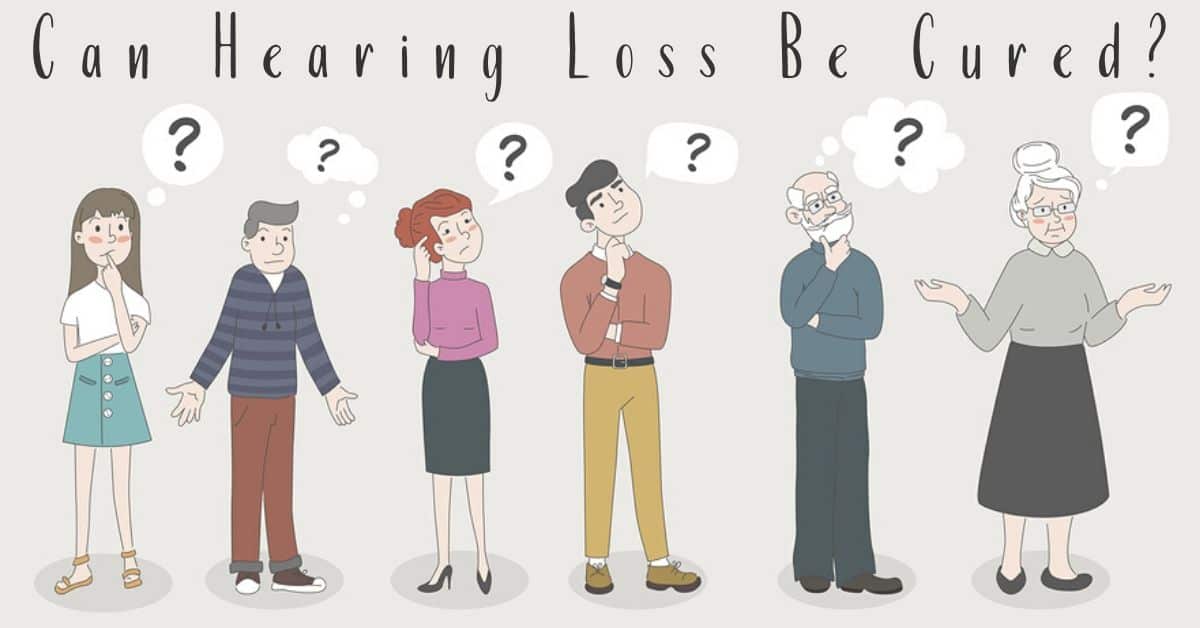Have you noticed any recent changes to your hearing abilities? You may be struggling to follow conversations in places with a lot of background noise or find yourself turning up the volume on the TV for the third time this week. Maybe you feel like the people around you have started mumbling, or that you can’t hear the kids playing in the backyard. As you grapple with hearing loss, you may wonder if hearing loss can be cured.
Types of Hearing Loss
There are two main types of hearing loss, and the hearing loss you have will determine your treatment options. Conductive hearing loss is due to a blockage in the ear canal or the middle ear that stops sounds from reaching the inner ear. It’s often caused by a buildup of earwax in the ear canal, or fluid in the ear canal or middle ear from an ear infection or other illness. This hearing loss can sometimes be reversed by treating the cause of the hearing loss, such as removing impacted earwax, or treating an infection to drain the ear and restore hearing.
Sensorineural hearing loss is the most common kind of hearing loss, and it’s caused by damage to the cells of the cochlea, or inner ear. This type of hearing loss is the result of exposure to loud noise, or develops as part of the aging process. Sensorineural hearing loss can’t be cured.
Hearing Loss is Permanent
Inside the fluid-filled cochlea are rows of delicate hair cells. When sound waves make their way down the ear canal and hit the eardrum, the fluid in the inner ear moves. The hair cells sense the movement of the fluid and translate this movement into electrical impulses that are sent to the brain for processing. Once the hair cells in the inner ear have been damaged or destroyed, they can’t be repaired, and you’ll lose your ability to hear certain sounds. This hearing loss is permanent. There is currently no cure for sensorineural hearing loss, and the best treatment option is to improve your hearing by wearing hearing aids.
Researching Cures for Hearing Loss
Over the past few decades, researches in labs across the world have been working to find a cure for hearing loss. One such scientist, Dr. Albert Edge, found that a certain molecule can grow new hair cells, and he was able to restore some hearing in deaf mice. There’s hope of developing a hair cell regeneration treatment, based on findings that many birds and reptiles with damaged hearing can regenerate the damaged cells in their ears. Dr. Edge hopes that in the future his research with mice can be applied to humans as well.
There are also labs doing stem cell research. Stem cells are the basis for all the tissues in the body, and stem cell transplants could be the answer to curing hearing loss. Dr. Stefan Heller at the Stanford University School of Medicine is looking at how stem cell therapy could restore hair cells, and reverse hearing loss. They’ve been researching inner pillar cells, and ways that they may be able to restore hair cells and cure hearing loss.
Another approach to curing hearing loss is gene therapy. Researches have already isolated the gene that stimulates hair cell growth, and are working to treat hearing loss using this gene. They hope to regenerate human hair cells, and reverse sensorineural hearing loss once and for all. Before long, there may be more than one treatment option available to cure hearing loss!
Treating Hearing Loss
For now, the best way to maintain your hearing health and prevent further irreparable hearing loss is to treat hearing loss with a quality pair of hearing aids. Modern hearing devices are designed for the best in functionality and clear hearing, and you’ll enjoy features such as seamless connectivity to your smart phone, background noise reduction, and speech enhancement to help you follow conversations with ease. You’ll benefit from the most natural sound quality, and music listening programs will help you enjoy music again. While we all eagerly wait for a cure to hearing loss, do the right thing for your hearing loss today and find the perfect hearing devices to help you hear.


